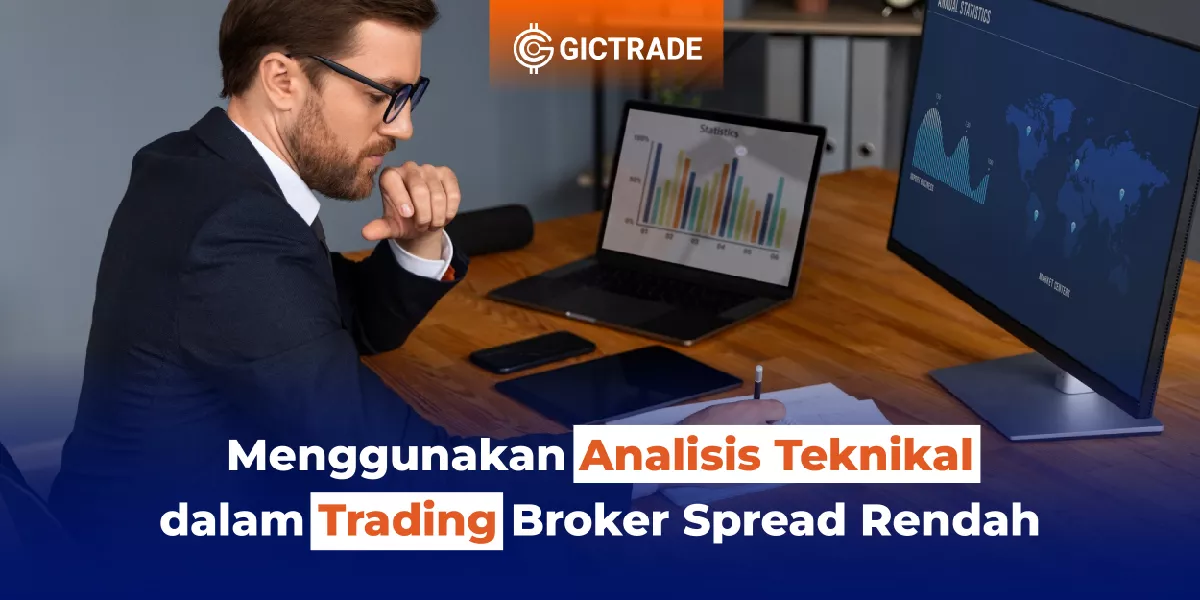Low Spread Brokers Are Safer - In the world of investment and trading, choosing a broker is an important step that can significantly affect your investment results. One factor to consider is the spread, which is the difference between the buy and sell price in the financial market.
This article will discuss why low spread brokers can be a safer and more profitable option for traders.
Table of Contents
What is Spread?
Before we discuss further about low spread brokers, let's first understand what a spread is. A spread is the difference between the buy price (bid) and sell price (ask) of a financial instrument such as a currency, stock, or commodity. This spread is the main source of income for brokers.

Benefits of Choosing a Low Spread Broker
1. Lower Transaction Fees
One of the main benefits of using a low spread broker is lower transaction costs. With small spreads, you can trade more frequently without risking too much of your capital. Low transaction costs also mean that you will have the potential for greater profits.
2. Fast Execution
Brokers with low spreads tend to have faster execution systems. This means your orders are executed more efficiently, which is crucial in fast-paced trading. You don’t want to miss out on valuable trading opportunities just because of slow execution.
How to Choose a Low Spread Broker
1. Spread Comparison
Before you choose a broker, compare the spreads of several available options. Compare the spreads for the currency pairs or other assets you are interested in. Choose a broker that offers the lowest spreads for the instruments you trade.
Here are some things you need to consider when comparing spreads:
- Currency Pairs or Other Instruments: Each broker may have different spreads for currency pairs or other instruments. For example, the spread for EUR/USD may be different from the spread for USD/JPY. Therefore, it is important to check the spread for the instrument you are interested in.
- Account Type: Some brokers offer different types of accounts with different spreads. Standard accounts may have higher spreads than ECN (Electronic Communication Network) accounts which usually have very low spreads. Choose the account type that suits your trading strategy.
- Market Volatility: Spreads can vary depending on market conditions. When the market is more stable, spreads tend to be smaller. However, when there is high volatility, such as during major economic news announcements, spreads can widen significantly. It is important to understand how brokers handle this volatility.
- Broker Terms: Each broker has their own rules and regulations regarding spreads. Some brokers may offer fixed spreads, while others may have variable spreads that can change according to market conditions. Make sure you understand the broker's terms and conditions regarding spreads.
- Other Fees: In addition to the spread, brokers may also charge other fees such as commissions, swaps, and withdrawal fees. These should also be considered in your comparison, as they can affect the final outcome of your trade.
- Broker Reputation: It is always important to choose a broker with a good reputation. Brokers with a good track record of providing reliable and transparent services tend to be a better choice.
- Trading Platform: The trading platform used by the broker can also affect trade execution and spreads. Make sure you are comfortable with the platform used by the broker.
2. Reputation Evaluation
A broker’s reputation is very important. Find out if the broker has been in business for a long time and has a good track record of providing reliable services. Also, check out reviews from traders who have used the broker.
3. Pay Attention to Other Costs
In addition to the spread, make sure you understand all other fees your broker may charge. This includes commission fees, swaps, and withdrawal fees. All of these fees can affect your profitability.
| Also Read : Optimizing Leverage Usage in Low Spread Brokers |
Conclusion
In the world of trading and investing, choosing a broker with low spreads can be a wise move. This can reduce your transaction costs, allow for faster execution, and overall, make your trading experience smoother. However, always do your due diligence before deciding on which broker to use. Make sure the broker has a good reputation and offers services that suit your needs.
5 Frequently Asked Questions (FAQs)
What is spread in forex trading?
Spread in forex trading is the difference between the buy and sell price of a currency pair. It is a transaction fee charged by the broker.
What affects the size of the spread?
The size of the spread can be influenced by market liquidity, volatility, and also by the broker itself.
Are brokers with low spreads always better?
Not always. In addition to the spread, you also need to consider other factors such as the broker's reputation and other fees they may charge.
How do I compare spreads from different brokers?
You can use a broker comparison site or look directly at the broker's official website.
Do all brokers offer low spread accounts?
No, some brokers may focus more on certain markets and offer different spreads for different instruments.
GICTrade, A Safer Low Spread Broker Suitable For Beginner Traders!
Forex platforms that offer low spreads are highly sought after by scalping advocates because this trading strategy involves many transactions in a day, and in this situation, commission costs can reach up to 100 pips.
To reduce operational costs in forex trading, traders choose a dealing desk with low spreads. Some traders even consider this criterion as the main thing in choosing a platform.
So what are the advantages of using low spreads?
With low spreads, the potential for financial losses can be reduced, which is certainly more in line with the basic principles of traders: making profits and keeping personal funds safe.
The listed forex platforms provide a choice of floating and fixed spreads with varying values, but remain at minimum or medium levels.
While it is possible to make a large initial deposit, platforms that offer micro and mini accounts still allow trading in small amounts.
So why wait? Join now and get some benefits!
One of the platforms with small spreads is GIC, which offers low spreads through the P2P (peer-to-peer) concept. By using the account type provided by GIC, traders can take advantage of the benefits of these small spreads.
GICTrade acts as a market maker by providing instant liquidity, reducing spreads and trading slippage.
The GICTrade platform offers very competitive spreads, although not the lowest in Indonesia at the moment. Additional benefits such as zero commission and free swaps make GICTrade a very friendly platform for traders.
After learning about the low spread platform, you can start trading with GIC and enjoy the lowest spreads we have.
 Last:
Last: 







